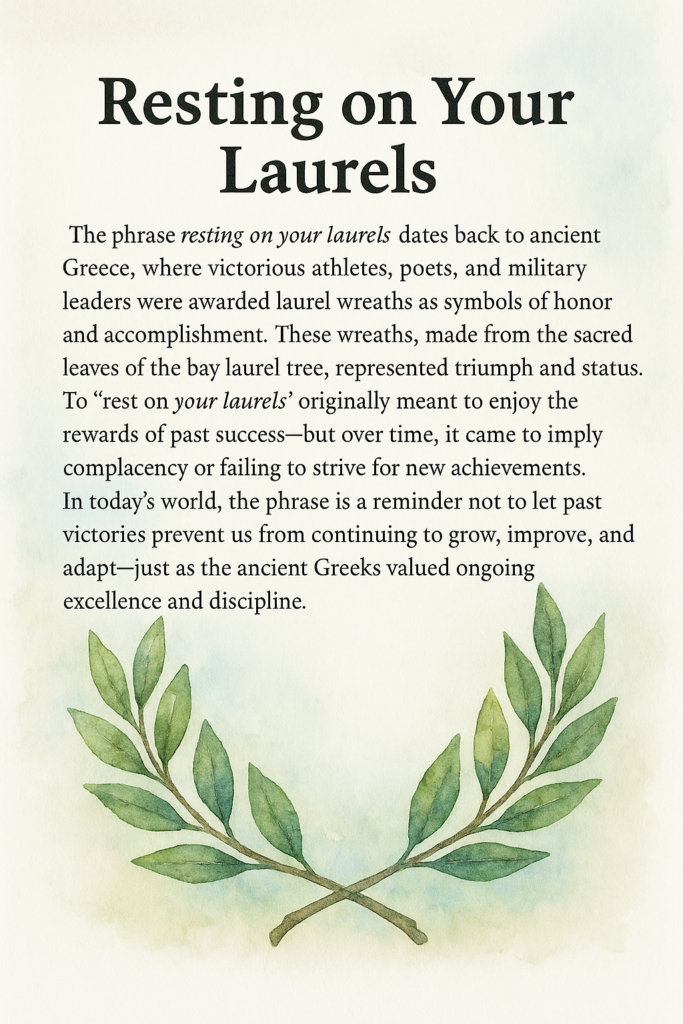
In uncertain economic times, a timeless piece of wisdom rings louder than ever: “Don’t rest on your laurels.” The phrase, which dates back to ancient Greece, originally referred to athletes and poets who were crowned with laurel wreaths to honor their accomplishments. But over time, it has evolved to carry a cautionary message: don’t rely solely on past achievements to carry you through the future.
According to The Free Dictionary, to “rest on your laurels” means to stop putting in effort because of satisfaction with past success. While confidence in past wins is natural, complacency—especially in financial planning—can be dangerous.
A Shifting Economic Landscape
We live in a time when there is always some “bad” news. Market volatility, inflation pressures, interest rate fluctuations, geopolitical tensions, trade wars, artificial intelligence, and shifting labor trends have created a highly dynamic environment. In this climate, what worked even a few years ago might not work today—and could be outright risky tomorrow.
Consider these questions:
- Has your investment strategy kept up with inflation?
- What are you comparing your performance to? What is your benchmark? Being up is good, but not if you trailed your benchmark.
- Are your tax strategies aligned with current legislation?
- Have you adjusted your retirement plan to reflect increased life expectancy and healthcare costs?
- Is your portfolio prepared for the implications of future economic slowdowns or political changes?
If the answer to any of these is “I haven’t thought about it,” you may be resting on your financial laurels.
 alt="" />
alt="" />Past Success Is Not a Plan
Maybe you’ve built a solid portfolio, paid off debt, or even achieved early retirement. That’s incredible—but it’s not a lifelong ticket to financial security. Financial planning isn’t a one-time accomplishment; it’s an evolving process that must adapt to changing realities.
We’re seeing more Americans live longer, face complex healthcare needs, care for aging parents, and support children well into adulthood—all while trying to preserve wealth and legacy. Past wins provide a strong foundation, but vigilance and adaptability are the bricks that build lasting financial resilience.
Financial Vigilance Is a Modern Superpower
Remaining proactive is not about fear—it’s about empowerment. Here’s what financial vigilance can look like:
- Annual Reviews: Reassess your goals, risk tolerance, and overall financial position at least once a year.
- Scenario Planning: Run “what-if” simulations to see how your finances would fare under different conditions.
- Diversification: Don’t let a single success story—like a booming real estate investment or tech stock—convince you to go all in.
- Tax-Aware Strategies: Stay informed about legislative changes, especially if you’re straddling states, countries, or retirement phases.
- Cross-Border Considerations: If you have interests in both the U.S. and abroad (especially Canada), double down on multi-jurisdictional strategies that protect you from double taxation or regulatory surprises.
The Laurel Wreath Is Meant to Be Worn, Not Sat Upon
The ancients got one thing right: achievement deserves recognition. But they also competed again and again, never assuming that yesterday’s crown guaranteed tomorrow’s victory.
Your financial achievements should be celebrated—but not used as an excuse to disengage. As personal and economic winds shift, so should your sails. With the right planning mindset, you can navigate uncertainty not with fear, but with wisdom and flexibility.
In short: keep your eyes open, stay humble, and never stop planning. Your future deserves more than laurels—it deserves your best attention.




